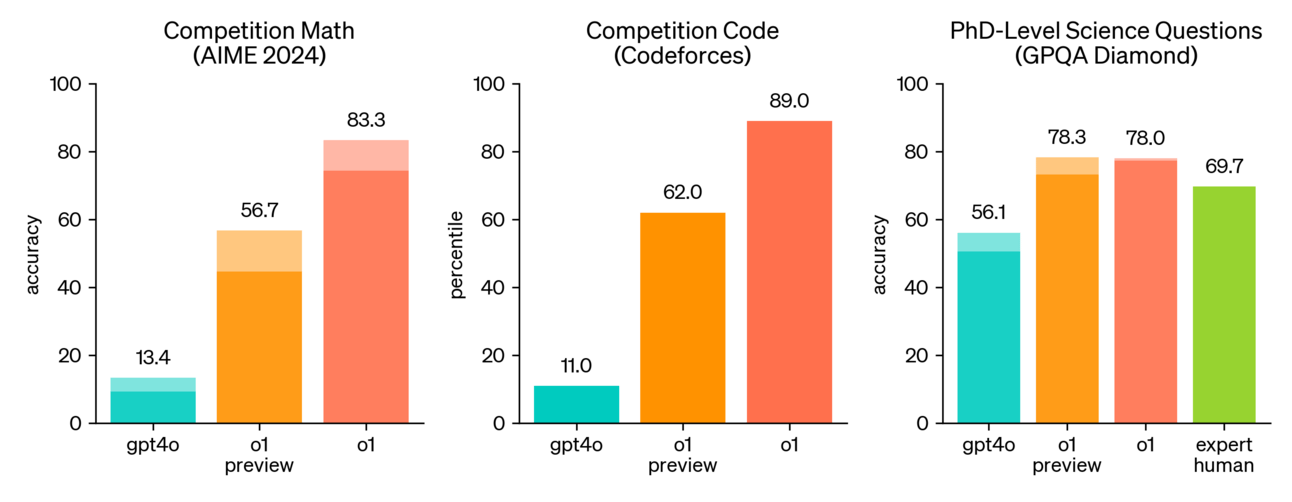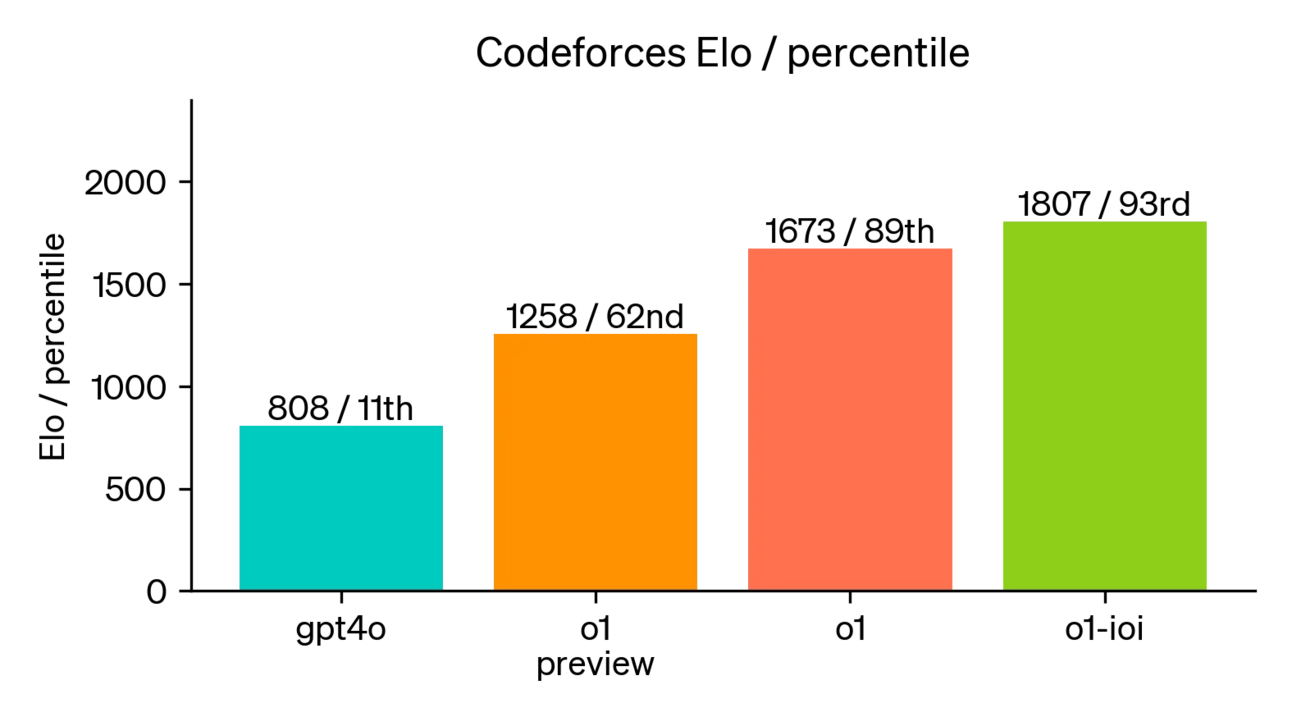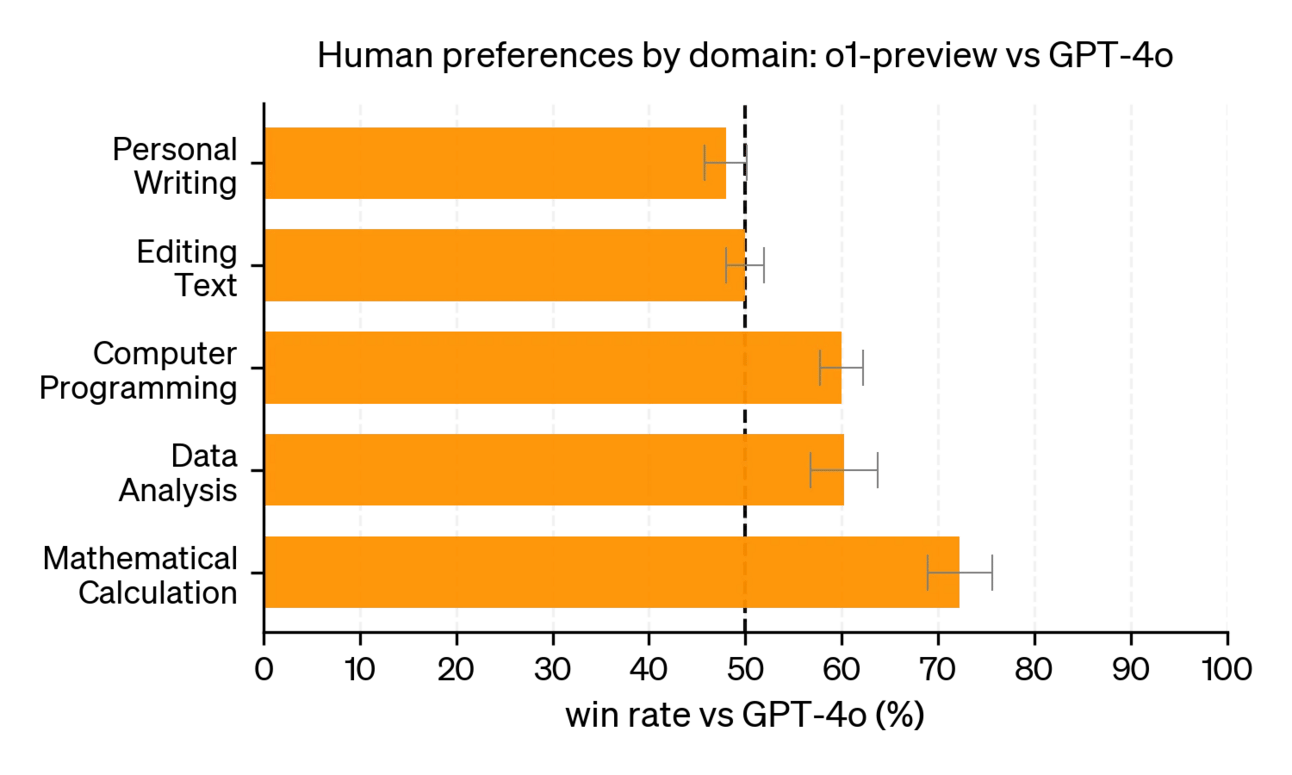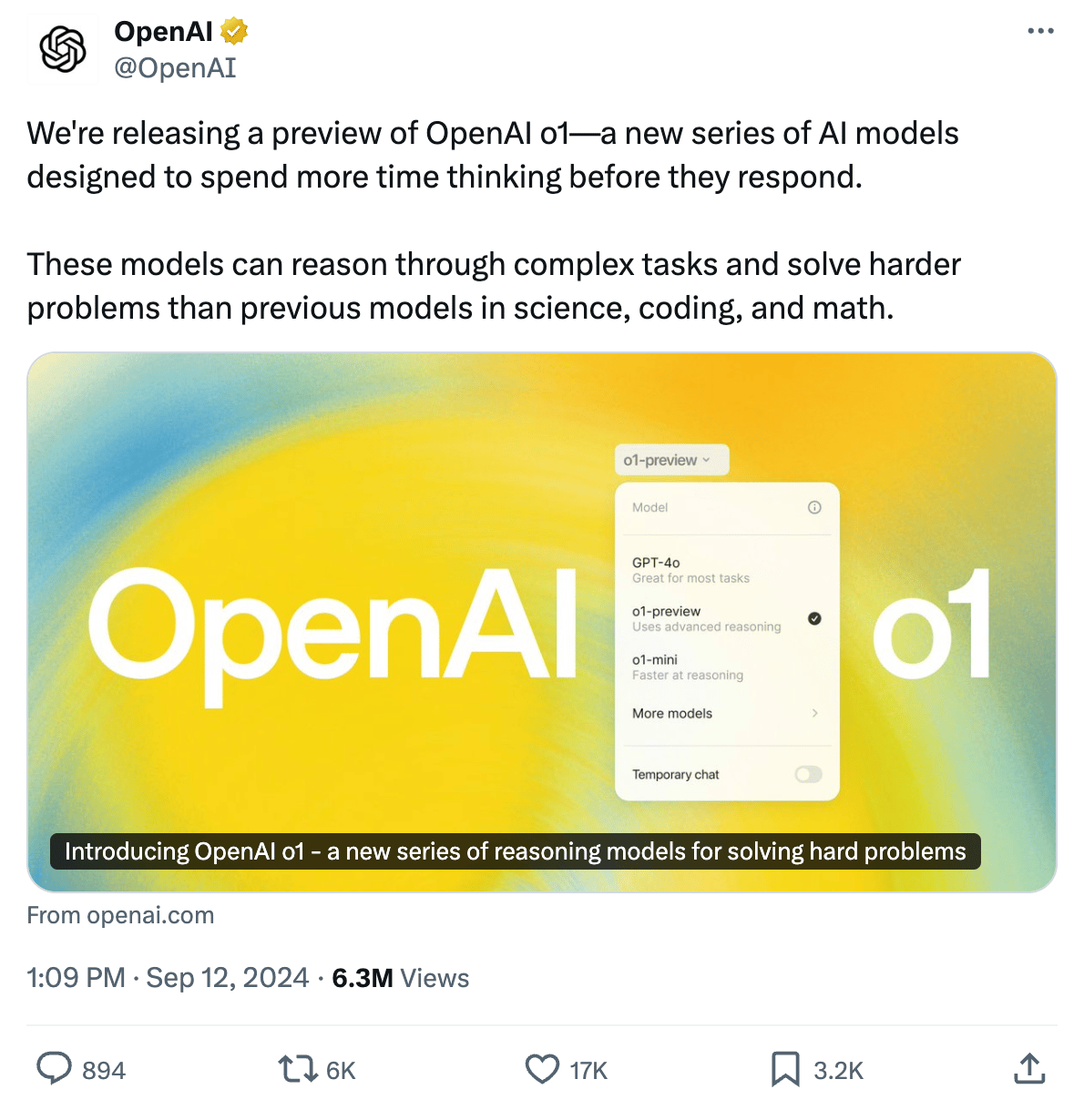- Monday Momentum
- Posts
- Monday Momentum: Unlocking Advanced AI Reasoning and the Future of Decision-making
Monday Momentum: Unlocking Advanced AI Reasoning and the Future of Decision-making
AI takes a giant leap forward in complex reasoning and problem-solving, but with great power comes great responsibility
The wait is now over - Chat GPT o1 (code name Strawberry) is finally here. Open AI’s recent announcement sent shockwaves through the tech community as the reasoning capabilities of this model exceeded even some of the lofty expectations for it. While we have only been given access to a “preview” version of this mode, it has already proven more than capable in handling complex tasks, advanced math, reasoning, and logic.
As we will see, this new model has surpassed PhD level human knowledge; but with great power comes great responsibility. Now, more than ever, privacy and ethics concerns are top of mind as AI continues to advance. How do we tackle these new technological advancements while ensuring that they are secure and safe? This, and more, in this week’s Monday Momentum!
The New Frontier
When most people think of AI, they envision tools for content generation, customer service, or automating routine tasks. But o1 is breaking new ground, going far beyond these conventional uses. This model is now equipped with advanced reasoning capabilities, enabling it to process complex information and solve problems that were previously out of reach for AI systems.
One of the most exciting advancements is its enhanced ability to tackle higher-level mathematical and reasoning tasks. We’re seeing o1 handle complex equations, simulate potential outcomes, and even project future market trends. In one recent use case, the model was used to predict future stock prices by analyzing historical data, identifying trends, and factoring in economic variables. This goes beyond simply following pre-set algorithms; it represents AI actively reasoning and making informed judgments, which can significantly enhance decision-making in industries like finance, research, and beyond.
Stats and More
ChatGPT 4-01 shines brightest when tackling highly computational tasks or areas requiring advanced scientific knowledge. Compared to its predecessor, GPT-4.0, the biggest leap seems to be in its mathematical abilities and handling of complex computational challenges. The model's improved capacity to break down multi-step problems and reason through intricate processes also makes it notably better at coding tasks.
In contrast, areas like English language and writing haven't seen as much of a leap forward with this release. This is understandable, given that previous models were already highly adept at handling most writing and literature-based tasks. After all, LLMs are fundamentally language prediction models, and current capabilities have proven sufficient for these applications.
One particularly exciting improvement, however, lies in the model's handling of "Global Facts." It has demonstrated better accuracy and a more rigorous approach to fact-checking itself. This represents a significant step toward professionalizing AI tools, making them more reliable and acceptable for mainstream users in industries where accuracy is crucial.
LLM Agnostic
Model preferences are increasingly task-dependent, and as LLMs become more advanced, we’ll see different models excel in specific areas. For tasks like personal writing and text editing, there isn’t a clear preference between o1 and its predecessor, GPT-4o. However, when it comes to complex analysis and mathematical computations, o1 clearly stands out as the better choice due to its enhanced capabilities.
This is also a great thing for end-users of AI — having more options and having these companies all trying to push the envelope will lead to a better product and more differentiated service offerings. Ultimately this benefits everyone; a healthy, competitive ecosystem will lead to advances more quickly and create better products.
The Birth of Slow AI
One fascinating development with ChatGPT o1 is its ability to openly think and reason, walking users through its thought process. In the past, generative AI was all about speed—real-time responses and quick output were seen as key pillars of the technology.
Now, we're witnessing the rise of a "slower" version of AI—an AI that takes its time, reasons through problems, and generates thoughtful, deliberate responses. While this approach may not be ideal for tasks like quick editing or fast answers, it’s essential for more complex applications that require deeper analysis and decision-making. This “slow AI” will likely become synonymous with advanced reasoning and critical thought, offering a new dimension of AI tailored to specific, high-level tasks.
As AI continues to evolve, we’ll see more specialized tools and experiences emerging, each tailored to the unique demands of different applications.
What this Means for Advanced Reasoning
With its advanced capabilities, o1 opens the door to entirely new possibilities. Its ability to understand context, handle ambiguous inputs, and break down complex problems elevates it from a simple assistant to a powerful decision-making tool.
Industries like finance, healthcare, and engineering are poised to gain the most from these upgrades. Picture an AI that not only gathers relevant data but also provides reasoning behind investment strategies, predicts market trends, or suggests treatment plans based on intricate medical information. This is the future that o1 is making possible.
For businesses, this offers an opportunity to incorporate AI more deeply into their operations. By processing vast amounts of information quickly and offering actionable insights, it can tackle everything from complex financial forecasting to detailed legal analysis, delivering real-world impact across a wide range of industries.
The Ethical and Privacy Considerations
With the enhanced capabilities of o1 comes a growing responsibility to address ethical and privacy concerns. As this model becomes more adept at processing sensitive information, the risks associated with how that data is used, stored, and protected increase significantly.
Privacy is one of the most urgent issues. Given the advanced nature of o1, both users and organizations must be mindful of the types of data the model processes. As AI begins to handle more personal and sensitive information—such as financial data, medical records, or proprietary business insights—the importance of strong privacy protocols cannot be overstated.
Ethics also play a key role in how these tools are deployed. While o1 offers powerful insights and predictions, it’s essential to remember that the model reflects the data it has been trained on. Without proper ethical guidelines, there’s a risk that AI could be misused, leading to biased decision-making or inappropriate handling of sensitive information. As AI becomes more integrated into our systems, maintaining ethical standards will be crucial to ensuring responsible use.
The Future of AI is Here, But We Must Proceed Thoughtfully
ChatGPT o1 is more than just an incremental upgrade—it’s a giant leap in AI capability. With its advanced reasoning skills and ability to handle complex tasks, this model is poised to become a valuable tool across various industries, from finance to healthcare. However, these advancements also come with increased responsibilities. Privacy, ethics, and responsible use must be prioritized as we integrate these powerful tools into our systems and workflows.
As AI continues to evolve, it’s clear that we’re entering a new era where machines are capable of reasoning and processing in ways that bring us closer to true artificial intelligence. The challenge ahead is to harness these capabilities for the benefit of society while remaining mindful of the ethical and privacy risks inherent in such powerful technology.
Stay tuned for more insights, and be sure to explore the full details of o1 in OpenAI’s official announcement.
TL; DR - ChatGPT 4-01 marks a significant advancement in AI, with improved reasoning and processing capabilities. The new model can handle complex tasks such as advanced mathematical reasoning, even projecting future market prices based on historical data. While these improvements open up exciting possibilities for industries like finance and healthcare, they also raise critical privacy and ethical concerns. As AI becomes more capable, responsible usage, data privacy, and ethical considerations must be prioritized.
A Tweet Worth Reading
What I’m interested in this week
“Apple debuts iPhone 16 with test AI software rolling out this year and next” in Yahoo Finance
Apple is making a big push to incorporate AI into its new generation of phones, and this will likely drive the largest upgrade cycle in recent history. From a smart business perspective, they are only making AI available on the new, soon-to-be-released tech.
“Man accused of using bots and AI to earn streaming revenue” from BBC
A very tame, but relevant, example of AI ethics. A man was able to create AI-generated music and then profit by creating bots to stream the songs and increase total plays. While this is relatively benign, it raises important questions about ethical considerations of this technology moving forward.
“Nations building their own AI models add to Nvidia's growing chip demand” in Reuters
As more models are built and trained, Nvidia stands to benefit from the increased computing needs. If sovereign nations continue to join the party, it will only add to the supply shortage and massive demand for these AI chips.
“OpenAI releases o1, its first model with ‘reasoning’ abilities” in The Verge
For another deep dive on o1 from a source that isn’t OpenAI, this article does a great job of summarizing some of the capabilities of this updated LLM.
A brief disclaimer: sometimes I include links in this newsletter for which I may receive a commission should you choose to purchase. I only recommend products I use - we currently do not accept sponsors.
Additionally, the contents in this newsletter are my viewpoints only and are not meant to be taken as investment advice.



